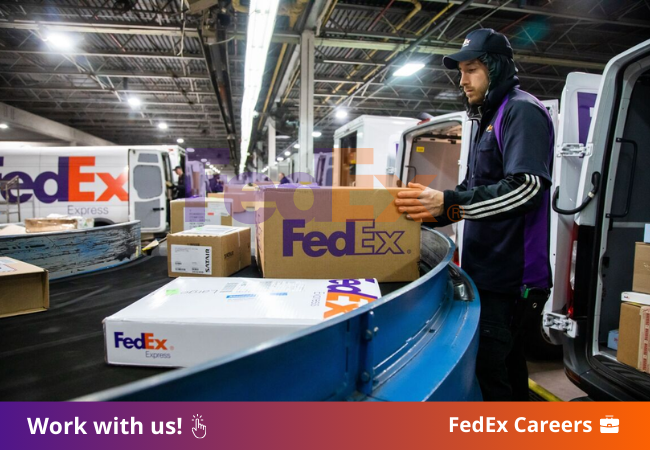The logistics industry is the backbone of the global economy, with companies like FedEx and Amazon leading the way in transportation, distribution, and supply chain management. As the demand for efficient and reliable logistics services continues to grow, there has never been a better time to explore career opportunities in this dynamic field.
Vacantes disponibles en tu región
Whether you’re interested in warehouse operations, delivery driver positions, freight forwarding, transportation management, or distribution center roles, the logistics sector offers a wide range of job prospects. Both FedEx and Amazon, two industry giants, are actively seeking talented individuals to join their teams and contribute to their ongoing success.
- The logistics industry is a crucial part of the global economy, with companies like FedEx and Amazon at the forefront.
- There are numerous career opportunities in the logistics sector, including roles in warehouse operations, delivery driving, freight forwarding, transportation management, and distribution centers.
- FedEx and Amazon are actively seeking skilled professionals to join their teams and help drive their logistics operations.
- To succeed in the logistics industry, you’ll need a combination of technical skills, problem-solving abilities, and a commitment to providing excellent customer service.
- Staying up-to-date with the latest trends and technologies in the logistics industry can help you stay competitive in the job market.
Exploring Careers in the Logistics Industry with Amazon and FedEx
Amazon Delivery Service Partner (DSP) Program
The logistics industry offers a diverse range of career opportunities, and the Amazon Delivery Service Partner (DSP) program stands out as a unique entrepreneurial path. This program allows individuals to start their own Amazon delivery business, providing them with the resources and support to build a successful logistics enterprise.
Through the Amazon DSP program, aspiring entrepreneurs can leverage Amazon’s brand, technology, and operational expertise to launch their own package delivery business. The program provides comprehensive training, discounted delivery vans, and access to Amazon’s logistics network, making it an attractive option for those interested in logistics entrepreneurship.
In addition to the DSP program, Amazon and FedEx offer a variety of other logistics career paths, including warehouse operations, transportation management, and supply chain analysis. These roles cater to individuals with different skill sets and interests, providing opportunities for growth and advancement within the dynamic logistics sector.
“The logistics industry is forecasted to grow by 22% by 2029, driven by e-commerce and new business models.”
According to industry data, the warehousing and logistics profession grew by 4% between 2019 and 2021 and is projected to reach over $12 billion by 2023. This growth, coupled with the rise of e-commerce and evolving business models, underscores the logistics business opportunities available to those seeking a fulfilling career in this field.
Working in the Logistics Sector: How to Get a Job at FedEx and Amazon
The logistics industry is the backbone of the global economy, connecting businesses and consumers worldwide. If you’re interested in pursuing a career in this dynamic field, understanding the job requirements and application process at leading logistics providers like FedEx and Amazon can be invaluable.

To secure a job at FedEx or Amazon, you’ll need to demonstrate a strong set of logistics-specific skills. This includes proficiency in areas such as supply chain management, inventory control, transportation planning, and warehouse operations. Additionally, experience with logistics technology, data analysis, and project management can set you apart.
- Possess a Bachelor’s degree in logistics, supply chain management, or a related field
- Gain practical experience through internships or entry-level positions in the logistics sector
- Obtain relevant certifications, such as the Certified Logistics, Transportation, and Distribution (CLTD) or the Certified Supply Chain Professional (CSCP)
- Develop a keen understanding of the latest trends and challenges in the logistics industry
When it comes to the application process, both FedEx and Amazon have rigorous requirements. Be prepared to undergo extensive background checks, financial reviews, and interviews. Highlighting your problem-solving abilities, attention to detail, and strong communication skills can give you a competitive edge.
“The logistics industry is constantly evolving, and companies like FedEx and Amazon are at the forefront of innovation. If you’re passionate about logistics and supply chain management, these organizations offer incredible opportunities for growth and advancement.”
By understanding the logistics job requirements and applying strategic job-seeking techniques, you can position yourself for success in this dynamic and rewarding industry.
Climbing the Corporate Ladder in Logistics
For those seeking to advance their careers in the dynamic logistics industry, there are a myriad of leadership roles to explore. From logistics managers and supply chain analysts to the increasingly sought-after C-suite positions, the logistics sector offers ample opportunities for career growth and professional development.
Leadership Roles in Supply Chain Management
One of the key leadership roles in the logistics field is that of the logistics manager. These professionals oversee the efficient movement and storage of goods, ensuring seamless operations throughout the supply chain. They are responsible for inventory management, transportation planning, and coordinating with various stakeholders to optimize logistics processes.
Another crucial role is the supply chain analyst, who leverages data-driven insights to identify areas for improvement, enhance efficiency, and make strategic decisions. These analytical thinkers play a vital role in driving innovation and responding to evolving market demands.
At the executive level, the Chief Supply Chain Officer (CSCO) and Chief Logistics Officer (CLO) positions have become increasingly important. These C-suite leaders are responsible for aligning the organization’s logistics and supply chain strategies with its overall business objectives, ensuring a competitive edge in the market.
To climb the corporate ladder in the logistics industry, professionals must possess a unique blend of technical expertise, strategic thinking, and strong leadership abilities. Continuous learning, adaptability, and a keen understanding of industry trends are essential for those aspiring to reach the pinnacle of supply chain management careers.
The logistics industry is undoubtedly experiencing a period of significant growth and transformation. As global supply chains continue to evolve, the demand for skilled professionals in the field of logistics and supply chain management is rising steadily. The insights gleaned from the discussion with supply chain expert Cathy Morrow Roberson highlight the immense career opportunities available within leading logistics companies like UPS, FedEx, and Amazon.
From the innovative delivery services offered by Amazon to the impressive fleet and data-driven operations of FedEx, the logistics industry is at the forefront of technological advancements and operational efficiency. Aspiring professionals can explore a diverse range of fulfilling roles, whether it’s starting an Amazon Delivery Service Partner (DSP) business or climbing the corporate ladder to assume leadership positions in supply chain management.
As the logistics industry outlook remains positive, with continued growth and logistics career growth opportunities, individuals with a passion for problem-solving, technology, and optimizing supply chain processes can find a fulfilling career path in this dynamic sector. By staying informed about the latest supply chain management trends and leveraging their skills, ambitious individuals can thrive in the ever-evolving logistics landscape.



